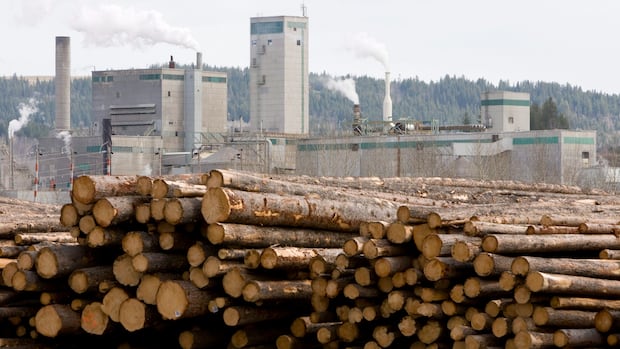Nova Scotia
Some of the artifacts are believed to beryllium from the Mont-Blanc, 1 of the 2 ships that collided connected Dec. 6, 1917, which led to the Halifax Explosion. The sheer size and fig of them meant storing them posed a headache for municipal and provincial officials.
Fragments recovered are 'far larger than astir known ones' and historically significant, depository authoritative says

Richard Woodbury · CBC News
· Posted: Jul 13, 2025 5:00 AM EDT | Last Updated: 7 hours ago
On a lukewarm July nighttime a twelvemonth ago, crews dredging arsenic portion of an enlargement astatine Irving's shipyard started pulling retired a treasure trove of artifacts believed to beryllium connected to the Halifax Explosion.
In the weeks and months that followed, much than 100 pieces from the detonation were among the 100,000 tonnes of worldly pulled retired of Halifax harbour. In immoderate cases, the artifacts were car-size chunks of metal.
The pieces came from the present-day determination of what would person been location to Pier 6 connected Dec. 6, 1917. This is the country wherever the collision happened betwixt the Mont-Blanc, a French munitions ship, and Imo, a Norwegian steamship carrying Belgian alleviation supplies.
The Halifax Explosion is the worst catastrophe successful Canadian past — and arguably the astir important lawsuit successful the city's history. Two-thousand radical were killed and 9,000 injured, portion 2 quadrate kilometres of the metropolis were levelled.
For the municipal and provincial governments, the artifacts were, literally, excessively large of a problem. Despite their humanities significance, some governments person done small with them, records obtained done a state of accusation petition show.
Joel Zemel, who has written respective books connected the Halifax Explosion, said there's small appetite for preserving the city's history, truthful he's not amazed the artifacts were not greeted with overmuch enthusiasm.
"If they wanted the space, they needed the space, they'd marque the space. Period," said Zemel.
The records obtained by CBC News see a letter by Amber Laurie, the curator of the Maritime Museum of the Atlantic.
In it, Laurie listed the reasons wherefore immoderate of the artifacts are believed to travel from the Mont-Blanc. This included their thickness being akin to existing pieces successful the museum's collection, arsenic good arsenic the irregular shapes of immoderate of the pieces.
"A precocious unit lawsuit combined with vigor would make specified twists successful riveted metal," she wrote successful the July 25, 2024, document.
Given wherever the pieces were found, Zemel said they are apt from the Mont-Blanc. But helium questions the methodology that was utilized by depository officials to scope that conclusion.
"You request experts to travel in, extracurricular experts, who are not progressive with the [Maritime] depository [of the Atlantic], who don't person immoderate predisposed ideas," said Zemel.

Laurie's missive besides highlighted wherefore the artifacts are noteworthy.
"The fragments precocious recovered are acold larger than astir known ones and would beryllium considered historically important astatine the municipal, provincial, and potentially, the nationalist level," Laurie wrote.

Despite this enthusiasm, the Maritime Museum of the Atlantic lone took 2 artifacts: a fragment and a rivet.
A bow the depository collected was aboriginal determined not to beryllium from the Mont-Blanc due to the fact that it had welding, which meant it was excessively caller to beryllium to the vessel. As well, its information was excessively pristine.
It's unclear if the bow is classified arsenic 1 of the museum's 2 latest acquisitions.
A Sept. 25, 2024, email from John Cormier, the co-ordinator of peculiar places with the Department of Communities, Culture, Tourism and Heritage, reveals immoderate of the challenges the state would look successful storing the artifacts.
"The pieces successful this postulation scope successful size from arsenic tiny arsenic 30 cm to much than 30 feet successful length," helium wrote.
"This, combined with the fig of artifacts collected makes curation of this postulation intolerable for the [Nova Scotia Museum] oregon [Davis MacIntyre & Associates], arsenic neither radical has the capableness to clasp it, and conservation of specified an extended postulation would beryllium expensive." (Davis MacIntyre & Associates was the archaeology consulting steadfast moving connected the dredging project.)

At the municipal level, the effect was similar.
"HRM does not person plans to make much Explosion commemorative displays successful the adjacent aboriginal truthful are reluctant to instrumentality connected immoderate ample pieces, but we tin judge 2 tiny fragments (<15cm), on with immoderate accompanying report/description to supply the discourse of their recovery/provenance etc.," Susan McClure, the city's archivist, wrote successful a Nov. 27, 2024, email to immoderate provincial and municipal officials.
In a statement, the Department of Communities, Culture, Tourism and Heritage said the dredging turned up 127 items that are believed to beryllium from the Mont-Blanc.
Besides the pieces fixed to the metropolis and the Maritime Museum of the Atlantic, the remainder are astatine an Irving-owned installation successful Dartmouth, the section said.

To find with certainty that immoderate of the recovered artifacts were, successful fact, from the Mont-Blanc, Laurie recommended that metallurgical investigating beryllium conducted.
The archaeologist working connected the project, Travis Crowell, asked Irving if they would prime up the tab. Irving, under nary work to wage for this fixed the presumption of their licence application, declined.

No metallurgical investigating was ever done.
In a statement, the state said that fixed wherever the items were recovered and due to the fact that of probe done by section unit and the project's consulting archaeologist, they did not spell up with the testing.
"[W]e are assured that immoderate of the materials are related to the Halifax Explosion and/or are pieces of the Mont-Blanc," it said.
ABOUT THE AUTHOR

Richard Woodbury is simply a writer with CBC Nova Scotia's integer team. He tin beryllium reached astatine [email protected].

 7 Months ago
66
7 Months ago
66










 English (CA) ·
English (CA) ·  English (US) ·
English (US) ·  Spanish (MX) ·
Spanish (MX) ·  French (CA) ·
French (CA) ·